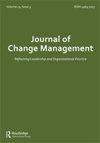Managing Responsibly Together: How an Obligation is Made to Matter in Top Management Team Work
IF 3
Q2 MANAGEMENT
引用次数: 0
Abstract
ABSTRACT The aim of this article is to contribute to research on responsible management by developing knowledge on how managing responsibly together in a Top Management Team (TMT) may be accomplished, thus complementing research in the area that focuses on the work of individual managers. To this end, we mobilize the concept of obligation to characterize what emerges as what a TMT needs to respond to. Having followed the TMT for a municipal company working together in meetings over time, we propose that three accomplishments (making the obligation present, making the obligation enable action and accounting for the obligation) shape how an obligation is made to matter. This is no linear process, but rather it unfolds in a series of materializations of the obligation in text and talk, as the TMT goes about its work. The article thus provides a contribution to research on responsible management but also has practical consequences for developing how a TMT works in order to address the urgent demands for change related to sustainable development. MAD statement In this article, we develop knowledge on how managing responsibly together may be accomplished in a Top Management Team (TMT). Besides adding to the responsible management literature, we also provide theoretical tools that may be mobilized in order to develop the work practices of TMTs that want to contribute to sustainable development.共同负责任地管理:在高层管理团队工作中如何使义务变得重要
本文的目的是通过开发关于如何在高层管理团队(TMT)中共同负责任管理的知识,从而对负责任管理的研究做出贡献,从而补充关注单个管理者工作的领域的研究。为此目的,我们调动义务的概念来描述TMT需要对什么作出反应的特征。随着时间的推移,我们为一家市政公司在会议上一起工作遵循了TMT,我们提出了三个成就(使义务出现,使义务能够采取行动和对义务进行会计处理)塑造了如何使义务发挥作用。这不是一个线性的过程,而是在TMT开展工作的过程中,在文本和谈话中对义务的一系列具体化中展开。因此,本文为负责任管理的研究做出了贡献,但也对开发TMT如何工作以解决与可持续发展相关的迫切变革需求具有实际影响。在这篇文章中,我们发展了如何在高层管理团队(TMT)中共同负责地管理的知识。除了增加负责任的管理文献,我们还提供了理论工具,可以用来开发想要为可持续发展做出贡献的tmt的工作实践。
本文章由计算机程序翻译,如有差异,请以英文原文为准。
求助全文
约1分钟内获得全文
求助全文
来源期刊

JOURNAL OF CHANGE MANAGEMENT
MANAGEMENT-
CiteScore
6.60
自引率
20.00%
发文量
14
期刊介绍:
Journal of Change Management is a multidisciplinary and international forum for critical, mainstream and alternative contributions - focusing as much on psychology, ethics, culture and behaviour as on structure and process. JCM is a platform for open and challenging dialogue and a thorough critique of established as well as alternative practices. JCM is aiming to provide all authors with a first decision within six weeks of submission.
 求助内容:
求助内容: 应助结果提醒方式:
应助结果提醒方式:


